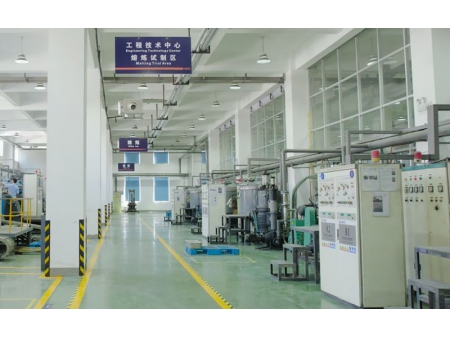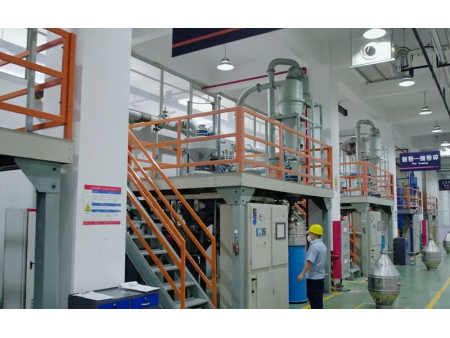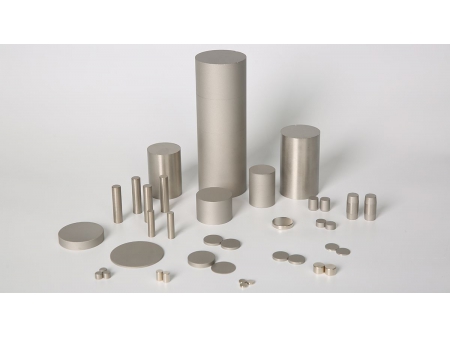Samarium Cobalt Magnets (SmCo Magnets)
Permanent magnet with high stability at high temperatures
Our Samarium Cobalt magnets are highly resistant to corrosion and oxidation, with high energy product and an extremely low temperature coefficient. The maximum operating temperature for our magnets can reach up to 250°C to 500°C depending on the grade, with no limit on negative temperatures. At working temperatures above 180°C, our magnets' maximum energy product, temperature stability, and chemical stability exceed those of NdFeB magnets. Our magnets are well suited for use in harsh environments, and we guarantee high quality and performance to meet all of your magnetic needs.
Crafted with meticulous precision, these magnets are the result of a careful blending process, combining Samarium, Cobalt, and other elements in precise proportions. These materials are then melted at high temperatures, powdered, pressed into various shapes, and sintered to produce a wide range of magnetic blanks of different grades. We use mechanical methods to process these blanks into the specific shapes required by our customers. After processing, we undergo magnetization treatment to increase their magnetic strength. These magnets possess magnetic properties and various magnetic effects that make them suitable for various applications in motors, magnetic machinery, sensors, microwave devices, and more. They play a crucial role in transferring and converting magnetic, mechanical, and electrical energies, enabling precise control of the system.
-
- D 1-130mm
- T 0.3-100mm
-
- D 1.2-100mm
- d 0.3-80mm
- D 0.3-60mm
-
- L 1-200mm
- W 0.5-100mm
- H 0.3-120mm
-
- W 3-100mm
- H 1-100mm
- L 1-100mm
- 1. Ingredient Mixing
- 2. Melting
- 3. Powder Production
- 4. Compression Molding
- 5. Sintering and Aging
- 6. Blank Inspection
- 7. Machining
- 8. In-process Inspection
- 9. Final Inspection
- 10. Packaging and Delivery
| Item | Unit | SmCo5 Magnet | Sm2Co17 Magnet |
| Density (D) | G/Cm3 | 8.3 | 8.4 |
| Curie Temperature (Tc) | K | 1000 | 1100 |
| Vickers Hardness (Hv) | MPa | 450-500 | 550-600 |
| Compressive Strength (δc) | MPa | 1000 | 800 |
| Resistivity (ρ) | Ω.Cm | 5~6×10-5 | 8~9×10-5 |
| Bending Strength (δb) | Mpa | 150-180 | 130-150 |
| Tensile Strength (δt) | Mpa | 40 | 35 |
| Coeff. of Thermal Expansion (α) | (10-6/℃) | ∥ 6 ⊥12 | ∥ 8 ⊥11 |
Please note that the above values are for reference purposes only and should not be used as the sole basis for material acceptance or rejection.
SmCo magnets find wide-ranging applications in various industries, including aerospace, transportation, and communication, specifically:
- Automotive industry, for electronic throttle pedals, ignition coils, engine intake sensors, position sensors, seatbelt sensors, ABS, and DCT shift forks.
- Medical equipment, for magnetic resonance imaging (MRI) machines and small medical motors.
- Aerospace industry, for various sensors and small motors.
- Mechanical transmission, for magnetic pumps, high-temperature reaction vessels, magnetic stirrers, and magnetic bearings.
- Microwave communication, for microwave isolators and traveling wave tubes.
- Railway transportation, for traction motors and generator rotors.
- Wide range of Samarium Cobalt materials: NGYC offers various grades of Samarium Cobalt with magnetic energy product from 10MGOe to 35MGOe. Specialized materials like high temperature resistant Samarium Cobalt that can withstand up to 500°C, low temperature coefficient Samarium Cobalt with a temperature stability of -10PPM, and high magnetic energy product Samarium Cobalt above 33MGOe are also available. Materials with different coercivities can also be provided to meet the different magnetization requirements of customers.
- High precision Samarium Cobalt magnet products: NGYC provides high precision Samarium Cobalt magnet products with high consistency, NS pole uniformity, and high magnetic angle control accuracy. These products are available in various sizes and shapes to meet the stable usage requirements of customers in different application scenarios.
- Diverse styles of Samarium Cobalt magnets and integrated magnetic components: In addition to conventional axial 2-pole and radial 2-pole magnetization, NGYC also provides various multi-pole magnetization products with uniform magnetic field distribution among poles. NGYC also designs and develops various adhesive and injection molded magnetic component products that can be directly connected to customer applications, making it more direct and convenient.
- Our magnets can reach a maximum size of 130mm x 130mm x 100mm and can achieve complete saturation magnetization.
- We can produce large quantities of Samarium Cobalt products with (BH)max ranging from 30-33MGOe, such as the high-grade YXG-33H.
- We can produce flat multi-pole Samarium Cobalt products such as axial 2-pole discs, axial 2-pole rings, axial 4-pole rings, axial 10-pole rings, radial 4-pole rings, and axial double-track rings. The magnetization thickness generally cannot exceed 6mm.
- We can produce radial high-speed motor shaft Samarium Cobalt magnets with multiple radial magnets bonded within a diameter of 120mm. These can be magnetized together after assembly and reach complete saturation.
- We can customize special performance Samarium Cobalt magnets for customers and continuously research and provide new performance grades.
- We can customize and produce super high magnetic energy product YXG-35 grade Samarium Cobalt products with Br up to 11.6-12KGS and (BH)max up to 32-35MGOe, making it the highest magnetic energy product in the Samarium Cobalt industry.
- We can produce magnetized products with a deviation of 1° or less from the mechanical axis (magnetized products).
- We can customize and produce low temperature coefficient LTC(YXG-18) grade Samarium Cobalt products with a temperature stability of -0.001%/℃ for Br at RT-100°C, providing excellent temperature stability.
- We can customize and produce high temperature resistant HT500 grade Samarium Cobalt products that can work at temperatures up to 500°C.
- We can produce assembled Samarium Cobalt magnetic components with various complex shapes and multiple angles of magnetization, such as the Halbach array.
- We can mass produce 1:5 pure Samarium Cobalt products.
- We can produce high HK and high stability Samarium Cobalt products with HK≥18KOe in large quantities.
Contact our specialist to identify a custom solution for your application.
- The notation of the grade is different: SmCo5 is generally represented by YX, while Sm2Co17 is represented by YXG.
- The composition is different: SmCo5 is mainly composed of samarium, cobalt, and praseodymium, or pure samarium cobalt without praseodymium. Sm2Co17 is mainly composed of samarium, cobalt, copper, iron, and zirconium.
- The physical properties are different: SmCo5's maximum working temperature is 250℃, while Sm2Co17's maximum working temperature is 350-500℃. SmCo5 has better mechanical and physical properties and is easier to produce, while Sm2Co17 is more brittle.
The physical properties of samarium cobalt magnets make them brittle and prone to chipping or breaking under force. The production of one magnet involves more than ten processes, and small chips or breaks can occur during processing, inspection, transportation, or use. Therefore, we recommend that you handle and protect the magnets with great care throughout these processes. Nevertheless, small chips or breaks may still occur.
Yes, samarium cobalt magnets contain iron and can rust. However, compared to NdFeB magnets, the iron content in samarium cobalt magnets is lower, so rusting is not as severe. If the magnet is used in seawater, some rust spots may appear on the surface, but this does not affect its performance or usage.
The price of SmCo5 is higher than Sm2Co17 because SmCo5 contains more cobalt, and cobalt is a rare metal, making it very expensive. Therefore, although the magnetic energy product of SmCo5 is lower than that of Sm2Co17, the price is higher.
Samarium Cobalt magnets have good corrosion resistance, so they generally do not need to be plated. However, some customers may require plating for cosmetic purposes or if the application environment is harsh. We can provide a variety of plating types, including zinc, nickel, silver, copper, chemical nickel, nickel-copper-nickel, nickel-gold, nickel-tin, epoxy, and more.
We do not recommend unsaturated magnetization because the performance values of each batch of magnets will vary within a certain range, and it is difficult to adjust the voltage of unsaturated magnetization. Unsaturated magnetization products have extremely unstable performance and will change during use. Due to measurement errors, it is impossible to establish standard magnetic flux.
Currently, the highest performance samarium cobalt magnet that we can produce is YXG-35, with the following specifications: Br = 11,600-12,000Gs; bHc = 10,900-11,400Oe; iHc ≥ 18,000Oe; (BH)max = 32-35MGOe.
We accept cash, wire transfer (T/T), and letter of credit (L/C), with wire transfer being the preferred method. For small orders, infrequent annual orders, or initial order, payment is required before shipment. Once the trust has been built, we can consider monthly billing.
We have standard GD&T for our regular products, which can be found in the table below.
| Geometric Characteristics | Measuring Instruments | Measuring Instruction | Geometric Dimension Precision |
| Parallelism | Coordinate measuring machine (CMM) | Both magnet sides being processed need to be measured, put the probe on at least 4 points on each side of the magnet to perform measurement. Each side of block magnet: ≥40mm Cylinder magnet: ≥Ø40mm, 2 to 4 points more are required. | When block magnet ≥15×15mm, cylinder magnet ≥Ø15mm Parallelism≤0.1mm; When block magnet<15×15mm, cylinder magnet<Ø15mm Parallelism≤0.05mm; |
| Vision measuring machine | The difference between the distance 1 (the largest measured value) and distance 2 (the smallest measured value) is the measured value of the parallelism. | ||
| Perpendicularity | Coordinate measuring machine (CMM) | Make sure input the height and datum when performing the measurement of two sides of the magnet, with a result of measured dimensional values of mm. | With a right angle of 90°±0.5°, the perpendicularity is measured by converting according to the height. |
| Vision measuring machine | Measure the gap between the two adjacent straight lines (two adjacent angles against each other) to obtain the measurement result of angle value, such as 60°. | ||
| Concentricity | Coordinate measuring machine (CMM) | Measure both interior and exterior cylinders, and put the probe on 3 derived median points for each circular cross-section. | 0.1mm, not applicable for arc magnet |
| Vision measuring machine & dial gauge | Use the vision system to measure center points of two circles, so that the coaxiality can be obtained through the measurement of the distance between the center points of the two circles. Then, hold the magnet in place and use the dial gauge to measure the magnet. With the magnet rotation, the dial gauge measures around specified circumference to obtain the concentricity. | ||
| Symmetry | Coordinate measuring machine (CMM) | It is useful for measurement of shaped items. Set up a coordinate in the center of the surface, enabling the deviation to be accurately measured. | ≤0.15mm |
| Vision measuring machine | Set up a coordinate in the center of the surface, and measure the difference in distance between the two line segments (from the side to center line). | ≤0.10mm | |
| Flatness | Coordinate measuring machine (CMM) | Put the probe on at least 4 points on each side of the magnet to perform measurement. Each side of block magnet: ≥40mm Cylinder magnet: ≥Ø40mm, 2 to 4 points more are required. | ≤0.05mm |
| Cylindricity | Coordinate measuring machine (CMM) | Put the probe on 3 derived median points for each circular cross-section. | ≤0.05mm |
| V-block & dial gauge | Put the dial gauge at the starting point of the cylindrical item that is placed in the V-block, and rotate the item in contact with the dial gauge to the end point, thus determining the roundness. | ||
| Profile of a surface | Vision measuring machine | Measure the roundness of the R arc surface. | 0.1mm; 0.15mm for wire-electrode cutting |
We offer a wide range of permanent magnet materials to meet the diverse needs of our customers. Our offerings include Samarium Cobalt (SmCo) magnets, Neodymium Iron Boron (NdFeB) magnets, Ferrite magnets, Alnico magnets, injection molded magnets, bonded magnets, and rubber magnets, among others.
Absolutely! Our company has the complete capability to provide magnet assemblies composed of magnets and metal components. With over 600 advanced processing and precision machining equipment, we are equipped to deliver high-quality permanent magnet assemblies and plastic integrated magnets to our customers.
The need for coatings depends on the specific permanent magnet material used. Samarium Cobalt (SmCo) and Alnico magnets are corrosion-resistant and typically do not require additional coatings for enhanced protection. On the other hand, Neodymium Iron Boron (NdFeB) magnets are susceptible to corrosion and are always coated to provide effective corrosion protection. We offer three commonly used coatings for NdFeB magnets:
- Nickel-Copper-Nickel (maximum temperature of 200°C)
- Aluminum IVD (maximum temperature of 500°C)
- Zinc (maximum temperature of 200°C)
The answer depends on the attributes that are important for your specific application. Different materials offer different combinations of performance characteristics. Choosing the right permanent magnet material requires careful consideration and trade-offs. Share with us your specific requirements and application details, and we will recommend the most suitable product for you.
NGYC has obtained TS16949 and ISO9001 certifications for our quality management systems, which reflects our commitment to meeting the highest quality standards in delivering exceptional products and services to our valued customers.




